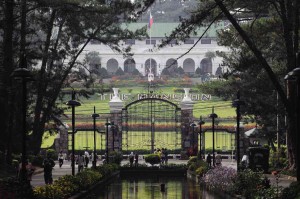
TOURISTS enjoy a visit to the Presidential Mansion in Baguio City, unaware that a portion of the official residence of the President had been overlapped with an ancestral land claim. EV ESPIRITU/INQUIRER NORTHERN LUZON
BAGUIO CITY—A section of the Presidential Mansion here has been covered by the ancestral land claim of a family, whose land title was recently validated by the Court of Appeals, the chair of the National Commission on Indigenous Peoples (NCIP) said on Tuesday.
Brigida Hamada-Pawid said Malacañang was upset about a report that the pumping station serving the official summer residence of the Philippine president was included in the claims of an Ibaloi clan.
The family was issued 28 certificates of ancestral land title (CALT) for lots encompassing the Mansion and the Wright Park in an NCIP en banc resolution dated Nov. 10, 2010, records showed.
“We are trying to reconstruct the papers and find out where the problem lies,” said Pawid, who assumed the NCIP post after the resolution was issued.
“There is a big difference between [ancestral land] claims that are legitimate and [ancestral land] titles that are issued because of the way they were processed,” said Pawid, who belongs to an Ibaloi clan in Baguio.
All of the ancestral land cases in the city involve Ibalois, who were displaced when the American colonial government built the summer capital in 1909.
The Baguio government sought to nullify the CALT through the Office of the Solicitor General (OSG). It had also challenged CALTs issued to families over eight titles awarded to the heirs of Cosen Piraso for lands on upper Session Road and a CALT covering a five-hectare property inside the Forbes Park reserve for the heirs of Lauro Carantes.
But the appellate court’s sixth division on Jan. 15 said Baguio was never exempted from the law recognizing indigenous peoples rights.
The CA’s Jan. 15 decision, penned by Associate Justice Marlene Gonzales-Sison, described the Indigenous Peoples’ Rights Act (Ipra) of 1997 (Republic Act No. 8371) as “a revolutionary law which now enjoins the organs of government to be vigilant for the protection of indigenous cultural communities as a marginalized sector, to protect their ancestral domain and ancestral lands, and ensure their economic, social and cultural well-being.”
The OSG had appealed the CA decision.
Pawid said Malacañang was “irritated” when it discovered the overlap, but NCIP officials in the Cordillera advised her that government surveyors could have skirted the Mansion. Vincent Cabreza, Inquirer Northern Luzon